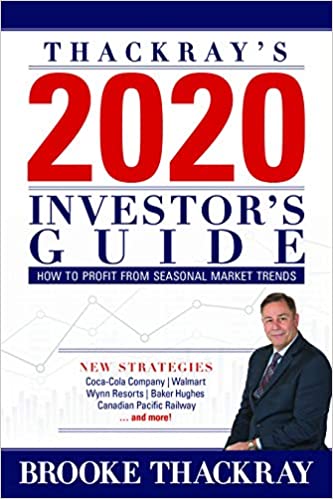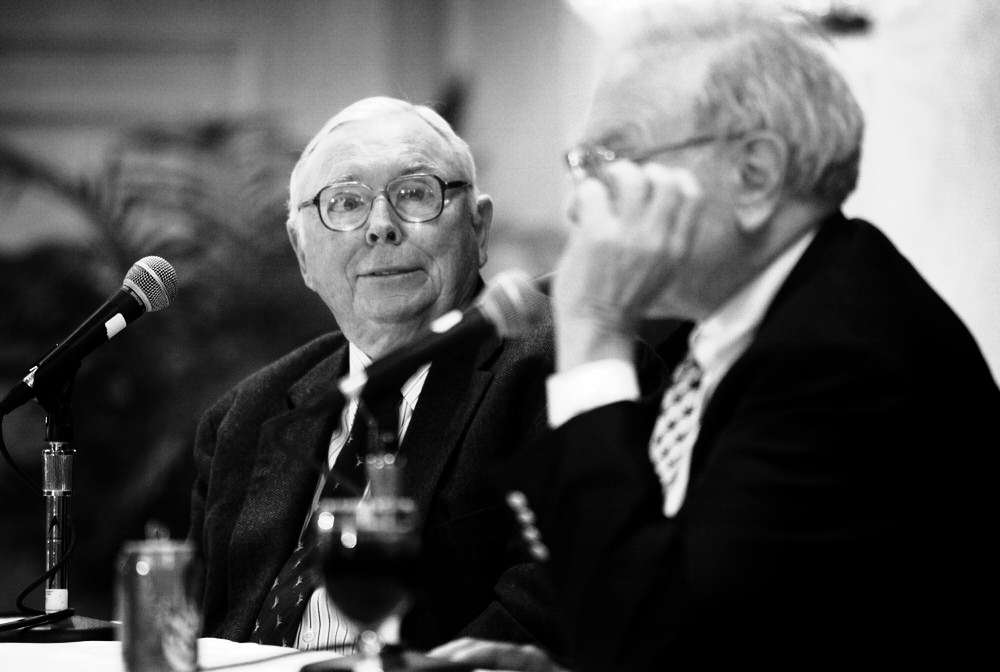Brooke Thackray is an expert on seasonal investing, a research analyst for Horizons ETFs, and sub-advisor of the Horizons Seasonal Rotation ETF (Ticker: HAC).
He is also the author of 9 books and guides on the subject, including Thackray's 2020 Investor's Guide: How to Profit from Seasonal Market Trends, available on Amazon.
Full transcript:
Pierre Daillie: [00:00:00] Hello and welcome to the Insight is Capital Podcast. My name is Pierre Daillie, Managing Editor of AdvisorAnalyst.com. Our guest is Brooke Thackray. Brooke has over 20 years of experience in the investment industry. He's Research Analyst for Horizons ETFs, and advises the Horizons Seasonal Rotation ETF, ticker symbol HAC.
His seasonal investing strategies are regularly featured in newspapers and magazines. And he's also a frequent guest on BNN Bloomberg. He's also the author of nine investment books and investing guides. Brooke, thank you very much for joining us and welcome to the show.
 Brooke Thackray: [00:00:37] Thank you for having me on the show.
Brooke Thackray: [00:00:37] Thank you for having me on the show.
Pierre Daillie: [00:00:39] So Brooke, you've been in the industry for well over 20 years. Where did you get your start and when did you decide to eventually do a deep dive into seasonal investing?
Brooke Thackray: [00:00:50] Actually, I started in the industry on the retail side, the sell side, back in the mid 1990s, with a firm called TD Evergreen. And, you know, at the time, I really got interested in, you know, the cycles and trends of the market. You know, people were trying to look at fundamentals and fundamentals weren't working at that time, and they say, what else is out there? And so this is who we're really stumbling around. But what really fascinated me was seasonal trends. Basically. You know, I started to take a look and say, Hey, you know, stock market tends to go up in this period of the year, more often than another period of the year, or certain sectors of the market tend to go up more often, a certain times of the year.
And I started to dive more into that, over time. And so in 1999 I actually wrote my first book with Bruce Lindsay. It was called Time In Time Out: Outsmart the Market Using Calendar Investment Strategies. So that was way back when and, and that was really focused on the six month cycle. and at the time it was probably the most seminal work on the six month cycle.
you know, since then we've had other people come along and do some really deep dives into that whole seasonality was Sell in May, as well. And you know, two professors have really taken this upon themselves from New Zealand, Jacobsen and Zhang, and looked at it internationally and across countries and across big swaths of the time, et cetera, at the time, the book we did was actually a very, very detailed on that. And that's something that I really followed up on. And over time I found that , more and more people have caught on to the seasonal trends basically, and said, yeah, I understand that there are some seasonal trends. It does make sense to me.
Back in the 1990s, that wasn't something that a lot of people were looking at.
Pierre Daillie: [00:02:26] We've been sharing your monthly newsletters with advisors for, close to a decade now. Seasonal investing really provides practical information for investors to use in terms of making those types of tactical decisions.
So how does it work? I imagine there's a mountain of data that you use in order to come to conclusions about different periods of the year, different months of the year when certain things , are in and are the things are out. And then there's anomalies, , exogenous events like the one we're in right now.
Also how well does it work? Given the run-up that we've seen in equities, I mean, they might bolster the Sell in May argument given where markets have come to. But that's my question for you is how does it work?
And then let's continue on from there.
Brooke Thackray: [00:03:12] Yeah. So let's start with, you know, how does it work? When is seasonality? Like what are seasonal trends in seasonal investing there? Well, there's two aspects to it. The first one is. And you were referred to Pierre in saying that, you know, the six months Sell in May phenomenon, which basically says that six months of the year the stock market tends to be weaker than the other six months of the year.
And it's often referred to as a Sell in May, period. And that's actually a really misunderstood phenomenon, by the way. because a lot of people will look at it and go, Oh, you know, if the stock market's up from may to October, look, it didn't work. You know? But the way to look at this is that, from my dates that I've used since the 1990s as being October 28th until May 5th and that period, the stock market tends to do better.
In that, in that six months and the other six months, it tends to be not as strong. On average, since 1950, it's actually been negative. But even, in bull markets, you find that that six month period tends not to be as strong. and so there's that six months seasonality for the overall stock market. It also deals with sectors of the market as well.
So that there's certain sectors of the market that go up at certain times of the year because of some sort of causational factor. It might be for commodity supply, demand and balances that occur in the energy sector. Or it could be earnings to come out at certain times of the year to help drive the stocks up at that time.
Or it could be conferences as well, but something happens every year. That drives a causational factor where investors become more interested in that sector and tend to push up the stock that sector.
Does it work all the time? No, it doesn't work all the time. Nothing works all the time, but what you're really doing is you're increasing the probability of success by saying, Oh, this is when technology tends to go up. This is when I'm really going to focus on technology or increase my weight in technology or whatever, however you want to play with it. That's the beauty about seasonality because anybody can use it with what they do. It doesn't mean if you have, if you're, you know, you use fundamentals.
You know, or technical. So it doesn't mean, Oh, I can't use seasonal trends. It actually compliments them. It's a, it's another screen to say, okay, this is the time to look in this particular sector. You know, it does provide the opportunity. So it actually works. quite well with all different, disciplines as well or by itself.
We actually use a combination of, seasonality, fundamentals and technicals as well. I'll get into that a little bit later on, for sure. But, so the pandemic is, as you said, a big, huge exogenous event that has come along. And this happens once in a while when the stock market, and that does not obey technicals. It doesn't obey Fundamentals. You know, coronavirus doesn't obey any, anything like this or seasonality as well. Now we can see that the stock market corrects sharply in a strong seasonal period from October 20th to May 5th. We've also seen most of the rebound take place in that time. Does it mean it's all out of kilter?
You know, that's it. It's going to be out of kilter for a few years and the stock market's going to continue to run in it's weaker six months. No, it doesn't. Sometimes it's the shock that happens because of something like this, but I can't tell you when it's going to get back on track, but it can't get back on track at any time.
And if you take a look at our advancement we're past, we're two thirds away from the bottom to the top again. So we've really bounced a lot, you know? So maybe this is the point where get some traction to get back on track, and I can't tell you that for sure, but it has thrown off seasonality a bit.
There's no question, but it can get right back on track from the six month period at this point, especially since we've seen that run-up already. As far as the sectors in the market go, I mean, we still expect sectors to do well within their seasonal periods . it's a longterm discipline.
What you're looking for is most of it to work, which would provide the alpha in order to perform well against the market. So, I think seasonality is poised it didn't really get off track too much because we saw a big V in the, in the, strongest seasonal period. And yes, some markets can still be weak over the next, over the next six months from here, which is that seasonal component where the market tends to be weaker, and I think we're actually poised for the market to pull back a bit, but it doesn't matter what I think, it's just, just tends to happen at this time of the year because the investors, I can tell you if it's tomorrow, the next day or the next month or the following month. But in this period, investors tend to try to cut down their risk and they tend to be, you know, say I don't want as much risk and they may pull back a bit.
And that's when you tend to find the bigger correction. So let me just give you a couple stats on it just to show you.
Go back to 1950 a to 2019 you say, okay. Look, what's a big for you? Never want to do. You never want to leave the market and then miss out on a big, huge run, you know, 10% or greater. So if you take a look from 1950 to current, and you say, okay, and in the period from May 5th may sex to October 27th that six month period, which is the Sell in May period, the S&P 500 has only gone up 10% or greater eight times.
Eight times. That's it. And all of those eight times were off of recessionary conditions, right? But if you look at the other six months of the year, from October 28th of May 5th the stock market's gone up 28 times 10% or more. So what that saying is you tend to get bigger returns in the favorable six months, and you don't get the big huge returns in the Summer months.
It can be rallies. Of course. But you tend to get stronger times in that period when we're coming off a recession. We may be heading into one.
We're not, we're not coming off of one. Although in today's world with the big V and how fast it's happened. I mean, yeah, who knows, but we're maybe heading into into a recession, so we're not primed for that 10% or greater and the odds aren't as strong anyhow.
The market just tends to be weaker at this time of the year.
Pierre Daillie: [00:08:40] I think what you might've been trying to say earlier, at least when you were beginning is that Sell in May tends to be viewed as a black and white decision as, as all or nothing and that's not the case, right?
It's not that markets are going to tank in the six months off period, you know, May to October. It's that they won't do nearly as well. The odds or likelihood is they won't do as well as they do in the on season.
Brooke Thackray: [00:09:05] That's correct.
That's exactly what it comes down to. There may be some returns, but there's. You've taken a lot of risk for those returns. And the way we tend to look at it is, "it's much better to focus on the sectors of the market that tend to do well in this time." Rather than saying, "Oh, I want just want to be in the market with a hundred percent equity at this time," because you're taking a lot of risk for , on seasonal, probability, small returns.
And if you take a look, let's just take a look at this last bull market market we've gone through from 2009
Pierre Daillie: [00:09:32] I wanted to ask you a question about that, but go ahead.
Brooke Thackray: [00:09:35] Yeah. So from 2009 to, you know, 2020 basically. In that time period. You take a look at the six months. Now, this is a, this is one of the best bull markets we've had, right?
The favorable six months from October to may, has had some very strong return. The other six months have had much weaker returns. In fact, in all cases except for except three cases. you've seen the favorable period from October to may outperform , the six months a year . So you've gotten bigger returns in a higher frequency of being successful from October to May.
And that's in the bull market when the market's been going up, and that's with the fed juicing the market at the same time. So we've had some really unusual conditions, but in, in normal markets, you tend to find that's exactly the case. In fact, over the longterm, from 1950, 62% of the time, the unfavorable market from may to October tends to be positive.
But the gains are so small on average.
Pierre Daillie: [00:10:33] Right. How do you tactically use that since these seasonal decisions are tactical in nature? How do you take advantage of that information without shooting yourself in the foot. I mean, if your mentality is , it's May the last six months have been really good and should I rebalance? like you use may or the sell in may seasonality to rebalance out some of the gains that you've had in equities into bonds, or, I'll let you explain it.
Brooke Thackray: [00:11:00] Sure. Well, there's two aspects to it, I think really in the first one is from the retail side. It's best to look at it as from October to may, you put your foot on the gas pedal. Right? Do you tend to use it within your risk, portfolio or parameters, you tend to move to the risk side, high-risk Scott, within what you can take or set up to be as appropriate. But in from may to October, you take your foot off the gas pedal and you reduce your risk. So that's really, that's the best way to think about it rather than...
Pierre Daillie: [00:11:31] What would be some ways that you would take your foot off the gas
Brooke Thackray: [00:11:35] By being in in cyclical equities, as an example and moving into sectors of the market that tend to do well in the summer months, whether it's gold, whether it's, you know, healthcare, you know, utilities, consumer staples. So there's a number of sectors you can move into that tend to do better in that period. So why not go into, into the sectors that do better at that time?
Pierre Daillie: [00:11:59] Right.
Brooke Thackray: [00:12:00] Rather than just say, okay, I'm just going to have the S&P 500 or the TSX composite or whatever it is, and that's what you can have. You want to say, okay, I want to reduce my risk by taking my foot off the gas pedal and focus on the sectors that work at the same time. And yes, you're right. You know, government bonds tend to do better in the summer months as well.
So you're diversifying across different asset classes, so you're making the portfolio. To be, you know, tends to be more balanced, tends it provided a better risk profile. So what you're really doing is you increasing the profile of risk adjusted returns so that you know your risk adjusted returns actually would look really good because you're adding this diversification across assets and you're focusing on what are typically, it depends with sectors as well.
Pierre Daillie:So it makes sense to build a portfolio using perhaps a group of sector funds as opposed to just buying an index. It would make more sense to build a portfolio that's spread out across different sectors and different market caps and different segments.
Brooke Thackray:Yeah. From a seasonal standpoint, that's exactly what you do.
You say, here's the market, here's, we can use ETFs and ETFs are wonderful tools. To use for something like this because really, sometimes you're in a position for four months instead of going off and buying a whole bunch of individual thoughts, and it still works. In fact, I read a lot about it, and individual stocks still works with individual stocks, but what you want to do. An ETF is great because it allows you to go into that space.
From a seasonal perspective, you know that oh, in four months time or whatever it is on average. That's a good time to get out of that sector. Now, the way we do that is we'll use technicals to make that decision , because if you think about it, there'll be, I'll come back to the question a second, but there might be 10 sectors or 15 sectors that are seasonally valid sometimes, and you're not gonna invest in all 15 sectors or those 10 sectors of the market, but some sub sectors.
So you do some metrics, technical tools to help say, okay, these are the, these are the five or six that we should go into. And you go and you'll use that to go in early. Go in late or not go in at all to the different two different sectors. And ETFs are a wonderful tool for that because you know, you have an exit date at some point and give or take a bet, you know, in our case, sometimes it's a month or a little bit longer, or we can say, okay, we can hold longer if there's stronger, strong momentum and say, okay, we'll use tight stops and you know, help with that management process.
But. It really has to be seasonal driven. With ETFs there's this wonderful way to actually get into that space and reduce the headline risk because you're going to be there for four months or three months or five months, depending on what, what the investment trade is.
Pierre Daillie: [00:14:47] So typically, Brooke, what is seasonally strong in the October to May period?
Brooke Thackray: [00:14:53] So in that period that, I mean, there's a number of sectors that you'll find technically strong at different times in that period. So you'd find technology does well, you know, starting in October
Pierre Daillie: [00:15:02] Why is that?
Brooke Thackray: [00:15:03] So the technology sector, if you take a look at technology, most money that's actually spent on technology is actually spent in Q4. , it's not, it's not just the retail side. You know, Apple used to come up with their conferences a certain time of year and that time of year, and they're all going to launch their products because the retail side, that's what people buy most of their technology.
On top of that. Companies as well. You know, if you've got a budget and you know you've got some money left in that budget, it takes a long time to figure it out. The furniture and spend money on furniture, you'll be great forever. But technology that goes really fast. So you find a lot of money gets spent on technology and technology companies have their Q4 calendar quarter year.
It tends to be, tends to be very strong and a lot of the products get announced that time. So investors want to be in there. Before that all happens. And that's why I don't get into the technology sector at that time as well.
You know, so there'll be some of the cyclical sectors, whether it seems industrials and materials, that'll do well, financials.
So there's some more cyclical sectors that tend to do well in that period, whereas the period we're in right now, from May 6th to October 27th, it tends to be the more defensive sectors that do well. And you know, this can be some innovations along the way where that's not going to hold true in the short term.
And you look back in March, February, March, you saw consumer staples, healthcare. Like, wow. I mean those, but there was a reason for that. That was a coronavirus, you know, put the focus on the health care, you know, if you want the dividends as well, consumer staples, because those companies were benefiting from what was taking place.
Investors still wanted it to be, invested in, they're going to healthcare. So that was out to sync. And that happens, you know, you can get out of sync like that. You know, we've seen the defensive sectors underperformed now coming back into the start of the seasonal period, but now we're in the seasonal period where they tend to perform better.
But in the short term, that may not be the case. But over the longer term, over the next few months. this tends to be a better time for those types of sectors. And they all have different start and end dates as well, but it tends to be, consumer staples and healthcare. biotech tends to do well in this time period, shortly within this time period as well.
At the same time, gold. As well. gold miners tends to, tends to, well, not right now. We're not. So when I'm saying the six month period, that's from may to October, but you know, gold tends to do well in July until, you know, late, late September, early October. So within that six month period, there'll be different periods where the different sectors will perform well.
Pierre Daillie: [00:17:37] One question I wanted to ask you about the, the bull market from March of '09 . Were there any ways in the bull market that seasonality was affected by easy money.
Brooke Thackray: [00:17:48] So I call the Fed my best friend because it juiced the markets, they're largely responsible for the strength of the bull market that's taken place since 2009 by the quantitative easing, their monetary policy.
So my best friend, because it juiced the markets. But also my worst enemy, because they tended to do it in the summer months when the market tended to be weaker. So what you'd see is you'd see the market would correct. And the fact that all of a says, Oh, we, you know, we have two mandates, you know, it's employment and price stability.
But you know, Greenspan said, a long time ago, the wealth effect of, basically saying that they want to keep a stable stock market because of the implications on the economy. And so when the stock market would tip over in the summer months with 2012- 2013 whatever, you know, in this time period, the federal reserve would come on and go, okay.
It's going down. We need to re, we need to jump into the market and do something here and they'd come up with something. Or they would announce something or they would meet at Jackson hole, Wyoming and late August, and you know, announced that they might be doing something and they would push the market up and at a time period when it typically wouldn't be strong.
Pierre Daillie: [00:19:02] So that would interrupt your thesis.
Brooke Thackray: [00:19:04] Yes and no. So there's no question. When I think of the last 10 years, despite the October-May time period strongly performing those six months of the year if the event didn't intervene like it did in almost all cases in that six month period from May to October, we would have seen weaker markets and we would have seen bigger downturns in what I call the unfavorable six month period for the stock market.
Now, even when they did this, overall, it's still stronger from October to May. If they did this in a time period. I just think the performance would have been much,... the dispersion between the two, would have been much bigger than what it is now? So seasonality's worked, but would have worked really well if the Fed wasn't doing what it did in the weaker times when the market tends to be weak, when it was weak.
Pierre Daillie: [00:19:52] How much of seasonality is fundamental to human nature versus a technical event. How much of it has to do with us, our behavior as corporate citizens or our behavior as consumers?
Brooke Thackray: [00:20:04] That's what way think about seasonality is we call it seasonality, but it's almost a misnomer because. It's really based on behavior.
And you hit the nail on the head, cause we're really taking advantage of people's behavior. That's the best way to think about seasonality. And as an example, let's just go through some examples that would show this. You know, if you said to somebody, when's the best time to buy natural gas?
Cause seasonality works with commodities as well. They go, "Oh, when it gets cold." That's the best time to buy natural gas. It's actually the best time to buy natural gas is before it gets cold. So when everybody else buys natural gas, when it starts to get cold, then you know, even natural gas is needed for heating, and when they're buying it, you want to be able to sell.
So the objective really is, is to get in before everybody else gets in. Right when everybody else gets in, you get out. That's really what it comes down to. The retail, you know, I know retail suffered greatly, you know, in a longterm structural decline over the last few years because of online shopping. But if you take a look at seasonality on this, the best time for retail isn't to buy when black Friday is happening, that's not when the best time is to buy is that it's before, right? So you went and laid out October. And then you say, okay, now everybody's getting in to the sector because the holiday shopping season's starting, I'm going to get out, cause retail tends to be weak in November and December.
The actual stocks. Another example would be UPS . UPS has underperformed the S&P 500 since it was launched in 2000. But, UPS does particularly well in fact, except perform the S&P 500 in that time period from from October 10th until December the 13th by almost 90% of the time.
So despite under performing overall on average, you wouldn't be better off than the S&P 500, in that window, almost 90% of the time you're going to beat the S&P 500 and substantially, not every single year, but very frequently. The average is actually very strong and there's a reason for that. It's behavioral.
If you take a look, people who will go and you know the average investor on the retail side wall.
Why would I buy UPS in the middle of the summer? What's happening? Nothing's happening.
You know, they say, "Oh, Christmas is coming up."
You know, that's what I want to get in. I want to be there because they look at making a decision to buy and to get into UPS or UPS can do well in the summertime and it has done well at different times, but the best time on average is, you know, from my cohort into December and to, to December, and it's because the average retail investor goes, Oh, I want to get into retail when they're really shipping stuff.
And no, that's the best time is before and before that takes place. In fact, you sell right before their busiest time of the year. The busiest time for UPS is actually, you know, mid December into late December. You want to be out. So it doesn't matter what the results are. You really taking advantage of people's behavior.
And that's true for the energy sector. Yeah, we can go through a whole bunch of different examples, but they're all the same. You want to get in before it becomes of an interest to everybody and when everybody else gets really interested and they start pushing the price up, then you get out. That's what it comes down to.
Pierre Daillie: [00:23:30] Well, I'm really, you know, one thing I'm looking forward to doing with you, Brooke, is, is doing a, a monthly or bimonthly, however it works, depending on, on what the seasonal periods are throughout the year, as opposed to the two, six month blocks.
Some of the elements that you've just been talking about are really interesting in terms of, in terms of getting ahead of retail, or getting ahead of natural gas, or getting ahead of UPS, or companies in that, in that domain, in terms of, of, when they're seasonally strong periods are, and when do you actually want to be a seasonal investor in those, in those trends?
You know, I think right now, one of the things that's really bizarre to most people. Even those who have been in the markets for a very long time is , many folks, maybe investors alike are dumb struck the stock market is going back to its previous highs while the economy is going into the worst position, perhaps in, in all of history.
And one comment I wanted to make was that seasonality. The study of seasonal trends makes more sense of what's happening in markets than looking at here's what's happening in the economy. Human behavior as a fundamental part of seasonal investing strategy makes more sense of the market than looking at the economy and the market and trying to make sense of that.
How has this pandemic affected seasonality or the seasonal investing strategy given that the U S for example, has close to 40 million unemployed.
Brooke Thackray: [00:24:53] Yeah. So I mean, I sure there's a huge disconnect right now with the economy and the stock market taking place, at least in the classical terms of what we think.
And you're right, I think, you know, investors are looking out past the normal time period. We typically say that the stock market forecast out six months to nine months, but we, we already know in six to nine months, economy won't be as strong as it was, based upon the trends that are taking place. And investors are looking out past that, into 2021-2022, and I call this, you know, some sort of duration expectation risk because they're really pushing out the expectations far out in the curve on something that we just don't know there's a lot of risk.
Pierre Daillie: [00:25:36] You just wrote about that in your latest newsletter.
Brooke Thackray's May 2020 Newsletter
Brooke Thackray: [00:25:39] Yeah, absolutely. And what that does is it just increases the tail risk of something happening. But from a seasonal standpoint, we don't get too caught up in that breakdown between the economy and then the stock market.
It doesn't make sense to me what's going on, you know, if I take a look at what's happening, with, yeah, as you say, there's companies you go, I don't understand it so well, and there's a lot of expectations for money's flooding into the market because everybody's trying to front run the Fed, but what does that mean from a seasonal standpoint?
So how do we reconcile that with seasonality? That's, that's really the big question for me, and that is the market tends to be more fragile over the next six months into October. So, you know, we may have a case of FOMO right now or whatever you want to call it, fear of missing out, or, you know, we can look at a whole bunch of different things that are taking place where companies are going off and investors are pouring into the market and expectations, very positive expectations, but the market tends to have bigger drops at this time of the year, tends to be more volatile, particularly in August and September. So August, September, October tends to be the three most, you know, you see a big ramp and volatility it takes place. So when all this is going on right now, it's from a seasonal perspective, you'd say, okay, well you can't really change the mandate of what you're doing and say, Oh, something's different happening.
You know, chase the market, for instance, because it can reverse on you and then nobody should, whatever investment somebody is looking to invest in, create a strategy, you created a discipline. You can't start breaking that discipline down and say, Oh, it might be something on that.
And it's the same with seasonal.
And I think that's absolutely appropriate for now because although we're seeing the market actually perform well, and this happens. It doesn't mean that May 6th the market goes down until October 27th that's not what that week seasonal period means at all. What it means is
Pierre Daillie: [00:27:42] exactly, it's not black and white.
Brooke Thackray: [00:27:43] It's not.
Pierre Daillie: [00:27:44] It's not about having a hundred percent risk and no real versus no risk.
Brooke Thackray: [00:27:48] Well, it's, yeah, it's, it's also to just. That it doesn't, the stock market doesn't go down every day, you know, slowly all that, all that time, there's rallies along the way. There's euphoria that takes place. There's corrections that take place, so you have to not worry too much about what's taking place and say, okay, seasonally, I know this is when the stock market tends to suffer a bit.
It can have bigger downturns. Is when you get, tend to get the bigger downturns and it tends to be more fragile as well. So something a catalyst can happen. And we saw that happen very quickly in February. You know, something like that can happen as well. So although I think you're right in the short term economy, you know, it doesn't matter if what's happening to stock market.
But I don't think you have to try and reconcile them from within a mandate. I think you have to start by saying this is what the mandate is. Here's how it works, and you have to trust that mandate.
Pierre Daillie: [00:28:45] yeah, it's still very much a matter of sticking to your rules and looking at the, at the chart for HAC it really demonstrates the discipline very well because it's been a very steady, steadily rising fund since inception. I won't get into the performance of it, and here and there, it gets interrupted by market disruptions, but it's a really nice looking chart. But that's really the benefit of sticking to the rules and saying, okay, this is a time, no matter what's happening, no matter how good the market's running.
This is the time to be paring back risk and October is the time to be increasing it.
Brooke Thackray: [00:29:17] Absolutely. I mean, we just don't know what's around the corner and something can change really fast and the narrative and the narrative can change really fast as well. And maybe in a couple of weeks time after Memorial day weekend, all of a sudden, the corner by a coronavirus cases spike or something and all the narrative changes, I can't tell you if that's gonna happen.
Right. And predict the future. I started to say, here's the mandate, and this is the way the seasonality works, and there's just a lot more risks to be invested, even if the market's going through some sort of euphoria stage. And you know, personally, I have my own thoughts on what it is, but it doesn't matter.
It's the seasonal trend that matters.
Pierre Daillie: [00:29:56] So if you had to pick. What is it that sticks out the most to you that confirms your belief in seasonality ? If you look at seasonality and you ignore all of the distractions in the market, what is it about seasonality what one or two things about seasonality is reassuring to you?
Brooke Thackray: [00:30:15] Well, I mean, if you take a look, seasonality's work quite well and this is a bull market. Now, if you go back and take a look at markets like 1966 to 1982 for instance, take a look at the seasonality of the broad market in that time period where the market moves sideways. Seasonality does even better.
So this is the toughest time for seasonality right now, over the last 10 years, because we've been in a strong bull market, and as I said before, the federal reserve has been juicing up the markets in that six month period when tends to be weak. I find it hard to stretch forward and say, over the next 10 years we're going to see the market, you know, substantially above where we are now.
You know, making 10%, 15% gains per year. It doesn't matter if that's the case or not. But I just find it hard to find that that's the case. So we're gonna we're going to repeat the same level of performance we've seen over the last 10 years. I find that hard to believe that that's going to take place.
It could, and seasonality would work, but I think the market's prime for the seasonality work better. One of the things I've done too is I've gone back and I always take a look at the seasonal trends and say, you know, which one, which one worked this year? How well did it work? And, you know, in this bull market, you know, the success rate, it's actually been quite good.
But I think it would be better. And with better returns in a more normal market, we tend to have more down years, you know, more volatility as well. So, and not a strong bull market. So I think it's well poised for the future. So that's, that's what I like about seasonality , that's my takeaway with how it's done.
Yeah. And also how it's really set up to do well in the future as well.
Pierre Daillie: [00:31:55] So, Brooke, given that we've been stuck at home for the last several months, is there anything you've been reading? Is there any, any books that you've been reading that, that you really enjoyed.
Well, typically what happens is I like to go away and I'd take about 10 books with me to read when I go away.
Brooke Thackray: [00:32:11] I was supposed to go on March break with my wife and, you know, I had all these books lined up and so excited, you know, and, we had that travel, advisory up two days before we were supposed to leave. So, obviously we couldn't leave. Actually, I'm writing my next book right now.
Pierre Daillie: [00:32:26] Oh, terrific.
Brooke Thackray: [00:32:27] Yeah. So, and I'm trying to do some really cool stuff for the next, next, next year as well. I've, I've come up with this series of videos recently, so actually this has been an extremely busy time for me, so I haven't had a lot of time to actually be delving into books. You know, I've got to get a list and put them away, but right now it's, it's more about writing and producing for me than actually reading.
Pierre Daillie: [00:32:50] Well, Brooke, it's been a sincere pleasure to talk to you today and get your insight on the market.
Brooke Thackray: [00:32:56] It's been a pleasure, doing the show with you and I look forward to coming back on the show, it's been a pleasure.
Copyright © AdvisorAnalyst.com













